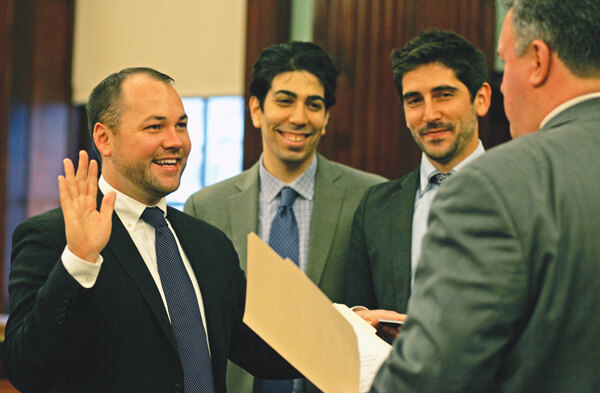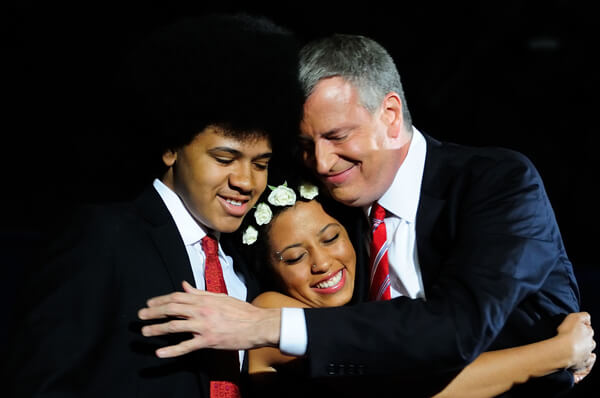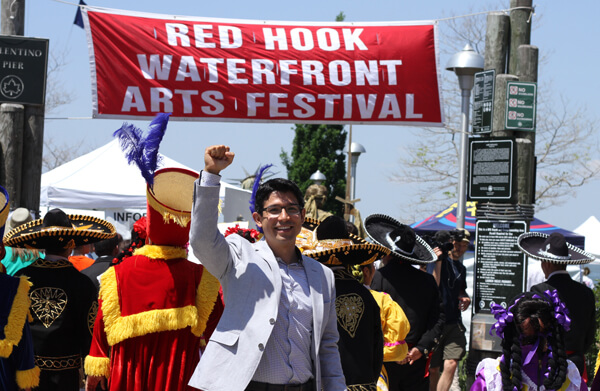Corey Johnson with Congressman Jerrold Nadler, a supporter, in the June LGBT Pride March. | GAY CITY NEWS
There is something about Corey Johnson that is carefully crafted. Or perhaps it’s everything.
The 31-year-old is vying with Yetta Kurland, a civil rights attorney, for the City Council seat that Speaker Christine Quinn has held for 14 years. For an interview with Gay City News, he arrived with his hair freshly cut, his light beard artfully trimmed, and his suit neatly pressed.
Johnson’s presentation was practiced, which is not surprising since he has been campaigning for months. He was well versed in the intricacies of city laws on housing and development. That is also not surprising because he has served on Community Board 4, which covers Chelsea and Hell’s Kitchen in Manhattan, since 2005 and has wrestled with some controversial development projects.
“You do not spend eight years on a community board because it’s sexy,” Johnson said.
But some people do spend eight years on a community board because it can be a stepping stone to elected office. Johnson believes he is prepared to hold the seat representing the roughly 180,000 New Yorkers who live in a district that runs from 55th Street to Canal Street and from Fifth Avenue to the Hudson River.
“I’ve never worked for an elected official,” he said. “I didn’t come out of a Democratic club.”
He will be a “councilmember who is community minded,” Johnson said, adding that he wants to be part of “progressive change” in the city. A significant issue is how the city approves real estate development plans.
For the past 12 years, the Bloomberg administration has favored large-scale projects, with some taxpayers objecting that they obliterate neighborhoods and favor market-rate housing at the expense of affordable housing. The city’s approval process — the uniform land use review procedure, or ULURP, as it is known — favors developers, opponents say.
Community Board 4 approved the expansion of Chelsea Market, a 300,000-square foot project that occupies an entire block between Ninth and 10th Avenues and West 15th and 16th Streets. Johnson opposed the expansion. Just as controversial was the Hudson Yards development, a 17 million square yard project on 26 acres that includes 20,000 apartments over the rail yards in the West 30s.
“We won some things and we didn’t get everything we wanted,” Johnson said, adding that he increased affordable housing units in that project from 20 percent to 26 or 27 percent. In her campaign for Manhattan Borough President, however, Julie Menin, a former Community Board 1 chair, pegs that number as low as 16 or 17 percent.
Ostensibly, ULURP begins at a community board then gets approval from a borough president and is then approved by the City Planning Commission and the City Council. The community board and borough president opinions are advisory. Critics say that developers meet with the commission and City Council members first and begin the ULURP procedure only after getting informal approval.
The process is “in need of major reform,” Johnson said. But it is defined in the city’s charter so that reform would have to be approved by the voters, he said.
When discussing his hopes for the City Council, Johnson emphasized plans to build more affordable housing, reduce class size in city schools, increase parks in the district, and bring a hospital to lower Manhattan to replace the now-closed St. Vincent’s Hospital and Medical Center. At least some of those plans do not square with his recent employment.
Johnson previously worked for GFI Development, a real estate developer that built two luxury hotels in Manhattan and an office building in Brooklyn. He did not mention that job publicly or on his campaign website until it was disclosed by citycouncilwatch.net, a website.
“I put none of my work history on my website,” Johnson said, noting that campaign experts told him that was not what the public wanted to read on such sites.
According to citycouncilwatch.net, Johnson boasted at a campaign event that 20 percent of the units in the Brooklyn building were affordable housing units. Those units have not been built. The project is not completed, Johnson said, but a “restrictive declaration” requires GFI to build those units.
“Whenever the project is built, they must abide by it,” he said. “My role was to make sure that whatever was done, it was done in a community-minded way.”
Johnson first entered public life when he came out to his teammates on the Masconomet High School football team in Massachusetts in 1999. The next year, his story went national with a 2,000-word profile in the New York Times and appearances on major TV shows. After high school, Johnson spent a year traveling across the country — 130,000 miles, he said — speaking at schools, meetings, and to the media about his experience.
Following that year, Johnson held a series of jobs at gay groups and on political campaigns, with some keeping him in the public eye. His campaign for City Council began in 2012 and he quickly raised roughly $168,000 from over 600 people, achieving the maximum he is allowed to spend in the September 10 Democratic primary.
Like any politician, he has put together a campaign that relies on a particular image He is an advocate for affordable housing so his GFI job and his current part-time work at the Sydell Group, a real estate development firm founded by former GFI senior staff, were omitted from his campaign material until citycouncilwatch.net reported them.
His image management, as a transplanted Massachusetts native who fell in love with the Big Apple, also ignores the year he spent living in San Francisco. He praised that city, just as he praises New York City now, in a 2001 profile in San Francisco magazine.
None of this is unusual for a politician, but Johnson can go to extremes. When Gay City News requested a copy of his campaign schedule, he refused to turn it over saying he feared Kurland would disrupt his events. He then made repeated promises to release his schedule, but never did. Most politicians routinely release their schedules.
Gay City News had a chance encounter with Johnson at a West Village diner where he described the difficult relationship he has had with Quinn. Moments later he disclosed personal details about his life that he said were “off the record,” so he understood he was talking to a reporter. Days later, he bristled, saying he was “disappointed,” when Gay City News said it might use the comments about Quinn in this story.
In an obviously choreographed story in May in the Times, Johnson said that he was HIV-positive and had known his status for over eight years. It is not clear if the piece was meant to minimize the disclosure or maximize attention to it, but it received little play in the press.
Other than having Community Board 4 call for increases in AIDS funding in the city budget, Johnson has no record on HIV matters. Asked what were his notable achievements on AIDS issues, Johnson said, “I actually think me being honest and telling my friends and me being a role model.”
Some of the paranoid tinge within the Johnson and Kurland campaigns may arise from the particularly aggressive nature of the race. The campaigns and their surrogates have charged each other with violating city campaign finance laws, using physical violence against volunteers, and other bad acts. Allegedly, it is the Kurland campaign that is whispering to voters that Johnson has no college degree.
“My life experience has been a rich one,” Johnson said, referring to his decision to end his formal education after high school. “I’m proud of my life experience.”






























